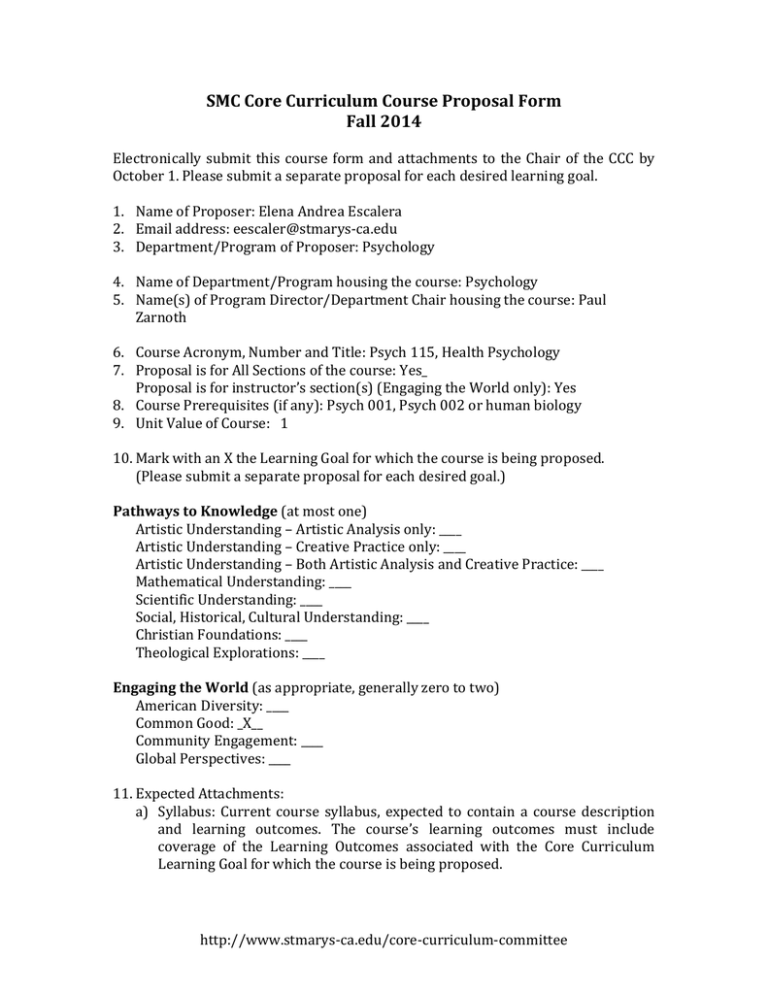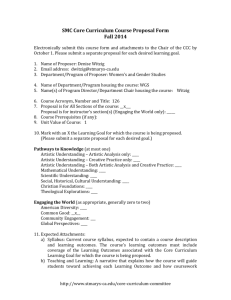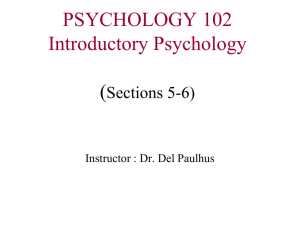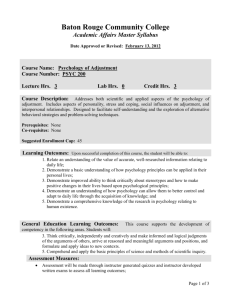Proposal
advertisement

SMC Core Curriculum Course Proposal Form Fall 2014 Electronically submit this course form and attachments to the Chair of the CCC by October 1. Please submit a separate proposal for each desired learning goal. 1. Name of Proposer: Elena Andrea Escalera 2. Email address: eescaler@stmarys-ca.edu 3. Department/Program of Proposer: Psychology 4. Name of Department/Program housing the course: Psychology 5. Name(s) of Program Director/Department Chair housing the course: Paul Zarnoth 6. Course Acronym, Number and Title: Psych 115, Health Psychology 7. Proposal is for All Sections of the course: Yes_ Proposal is for instructor’s section(s) (Engaging the World only): Yes 8. Course Prerequisites (if any): Psych 001, Psych 002 or human biology 9. Unit Value of Course: 1 10. Mark with an X the Learning Goal for which the course is being proposed. (Please submit a separate proposal for each desired goal.) Pathways to Knowledge (at most one) Artistic Understanding – Artistic Analysis only: ____ Artistic Understanding – Creative Practice only: ____ Artistic Understanding – Both Artistic Analysis and Creative Practice: ____ Mathematical Understanding: ____ Scientific Understanding: ____ Social, Historical, Cultural Understanding: ____ Christian Foundations: ____ Theological Explorations: ____ Engaging the World (as appropriate, generally zero to two) American Diversity: ____ Common Good: _X__ Community Engagement: ____ Global Perspectives: ____ 11. Expected Attachments: a) Syllabus: Current course syllabus, expected to contain a course description and learning outcomes. The course’s learning outcomes must include coverage of the Learning Outcomes associated with the Core Curriculum Learning Goal for which the course is being proposed. http://www.stmarys-ca.edu/core-curriculum-committee b) Teaching and Learning: A narrative that explains how the course will guide students toward achieving each Learning Outcome and how coursework (e.g., papers, exams, videotaped presentations) will be used to measure student achievement of each Learning Outcome. Please address the outcomes directly and one by one. Additional Guidelines: a) While courses and individual sections within courses may vary, the Core should provide relatively consistent experiences. Thus our expectation is that each section of a Pathway to Knowledge course will satisfy all the corresponding learning outcomes. We also expect that the features of any syllabus submitted are sufficiently generic to faithfully represent all sections of the course. The CCC relies on department chairs and program directors to oversee a reasonable degree of uniformity in how its courses address the learning outcomes. b) We encourage departments and programs to develop courses so that an Engaging the World goal can apply to all sections (in which case we will expect a representative syllabus). We also welcome proposals from individual instructors. c) Any course approved for the Core must provide data for the assessment of Core Curriculum learning goals at an institutional level. Via this proposal a chair/program director agrees to oversee the submission of the student work necessary for the assessment of the learning goals, and that his/her instructors of Core courses will participate in assessment exercises, if asked. Similarly, if the proposal is from an instructor, that individual agrees to oversee submission of work from appropriate sections of their course. d) (Legal and Logistical Workshop) Each instructor of a Community Engagement (CE) course must participate in a workshop each year before the course is taught. This workshop will outline the logistical and pedagogical support the College will be providing to CE courses, as well as provide updates on any legal or regulatory requirements of community-involved courses. At the workshops, instructors will be provided information about legal and logistical paperwork that must be completed by stated deadlines in order to ensure that each CE course / experience can run safely and effectively. e) (Pedagogical Workshops) Each instructor of a Community Engagement (CE) course is required to have training in the pedagogy of Community Engagement. Faculty who have studied the pedagogy of CE or taught such courses in the past are invited to submit those experiences to the Community Engagement Working Group as evidence of qualification. For faculty without previous CE experience or training, CILSA provides regular workshops each semester that will assist the instructor in integrating the community engagement learning outcomes into their course. (These workshops are also available for faculty who wish a refresher.) http://www.stmarys-ca.edu/core-curriculum-committee f) Faculty interested in determining whether a more permanent Engaging the World designation is appropriate for their course may apply for a one-year “provisional” designation. Please contact the chair of the CCC and/or chair of the Working Group for details. Core Curriculum Proposal Common Good Course Designation Psychology 115: Health Psychology Elena Andrea Escalera Teaching Health Psychology is a course that explores how psychology and health are interconnected, through the mind/body connection, through behavior, and through the interaction of the person with the health care system. This course has always had a strong social justice theme and focus, which is why I am now applying for a Common Good Designation. In Health Psychology, students reflect and write substantively on ways in which human beings find fulfillment in community. Students must attempt to change a health behavior during the semester. This could be getting more and regular sleep, eating more fruits and vegetables, using stress management, or getting more exercise. But unlike lay beliefs about health and psychology, students soon learn that willpower is a myth. It is a myth of a particular cultural individuality. Health, or wellness, exists as a systemic phenomenon, based in community connection and support. During this behavior change the students keep a reflective journal to track their progress and to see how it connects to larger social issues (such as social support, social engineering- resources and community design that supports their behavior, stress and demand, etc.). Students must track how they are supported or not supported by the system and how that impacts the success of their behavior change. Students are continually asked to articulate a critical account of just social order. This begins with the reading and discussion component of the course. Students engage in shared inquiry about current literature in the field, most of which is related to social justice. Students read Mark Oliver on the social model of disability, which holds that disability does not lie in the person, but in the inability of the system to accommodate different abilities. They read Oscar Barbarin’s paper on institutional racism, to understand how systems can be racist even though no person is intending to discriminate. Students read about how gender variation, stereotypes and cultural practices influence the kind of health care available to medical minorities. Discussion revolves around awareness of the issue and an analysis of the concrete social problems described in the articles. In terms of disability, students discuss adaptive technology and how it impacts the public’s view of disability and the degree to which mechanical adaptations decrease or increase humanness. This is the process throughout the semester with each topic. Social http://www.stmarys-ca.edu/core-curriculum-committee justice is seen as a health variable that is omnipresent in the understanding of health of the whole person and the system. Learning Students reflect and write substantively on ways in which human beings find fulfillment in community through both their reflective journals, which address the role of community in their personal health, and through examinations. Reflective journals are graded on the criteria of personal reflection, integration of the social justice readings, and application of these ideas to personal experience. Each of the examinations requires an essay question that integrates a social justice issue (such as racial discrimination) and a health phenomenon (high blood pressure). Students are asked to apply the Biopsychosocial model of health in each of these essays. Students are graded on their ability to articulate a critical account of just social order in discussion sessions and in their examinations. Students need to be able to articulate not just their position on a social justice topic, but also an alternative position as well. For instance, in discussion of death and dying, students must consider both sides of the issue. For assisted suicide, students need to consider and discuss both the position of the Right to Die, self-determination and patient dignity, but also the opposition which includes religious communities and the disability movement, who opposes such legislation as a danger to their lives. In addition, each semester the class is involved in an ongoing public good issue to increase their capacity for coherent, principled analysis of concrete social problems. One year the students had a skype session with Jeannette Beal, a blind teacher who specializes in helping children use adaptive technology. She was going to lose her job because the state of Massachusetts would not make an exception on how they administered a re-certification test that was incompatible with her screen reader. Students discussed this with Miss Beal and with themselves, and then wrote letters to Pearson/Vue (creators of the test) and the State of Massachusetts Board of Education. Last year the students were active in the hearings about the new BART “Fleet of the Future”. The changes to the BART trains make it impossible for wheelchair users to enter the train during rush hour. On the other hand, the new design will allow for more standing grab bars, which may make it easier for seniors and ambulatory disabled people to use the trains. Students could attend a hearing or write in to BART with their opinions. http://www.stmarys-ca.edu/core-curriculum-committee






